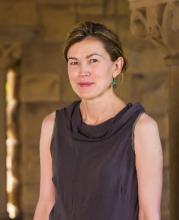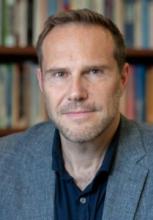Faculty
Professor Anna Gryzmala-Busse

Anna Grzymala-Busse is the Michelle and Kevin Douglas Professor of International Studies in the Department of Political Science, the Director of the Europe Centre, and Senior Fellow at the Freeman Spogli Institute at Stanford University. Her research focuses on the historical development of the state and its transformation, political parties, religion and politics, and post-communist politics. Other areas of interest include populism, informal institutions, and the role of temporality and causal mechanisms in social science explanations. She is the author of three books: Redeeming the Communist Past: The Regeneration of Communist Successor Parties; Rebuilding Leviathan: Party Competition and State Development in Post-Communist Europe; and Nations Under God: How Churches Use Moral Authority to Influence Politics. She is also a recipient of the Carnegie and Guggenheim Fellowships.
Professor Norman Naimark

Norman Naimark holds the Robert and Florence McDonnell Chair in East European History at Stanford University. He is also Senior Fellow of the Hoover Institution and of the Institute of International Studies, where he was Convener of the “European Forum.” He has served as Director of Stanford’s Centre for Russian and East European Studies (1989-95), Chair of its History Department (1995-1998), member of the Faculty Senate and its Steering Committee (2001-4), and Director of Stanford’s interdisciplinary programs in International Relations and International Policy Studies. He presently serves as the Burke Family Director of the Bing Overseas Studies Program. Naimark serves on the editorial boards of a number of leading journals in the field, including The American Historical Review, The Journal of Modern European History, East European Politics and Societies, and Kritika. He has also served on and chaired the major professional committees that foster research and exchanges with the successor states of the Soviet Union and Eastern Europe: the American Council of Learned Societies (ACLS) Joint Committee on Eastern Europe, and the International Research and Exchange Corporation (IREX) Program Committee. Naimark was elected to the Commission Internationale des Études Historiques Slaves, and was on the Board (and then President, 1997-98) of the American Association for the Advancement of Slavic Studies (AAASS). In the past, Professor Naimark’s writing focused on the problems of radical politics in the Russian Empire and Eastern Europe. Since publishing a major study of the Soviet occupation of Germany, The Russians in Germany and a comparative study of ethnic cleansing and genocide in 20th Century Europe, Fires of Hatred, he has been working on two projects: a Mellon Foundation sponsored seminar series on ‘Mass Killing in the 20th Century’ and a book on Stalin and Europe, 1945-1953.
Professor Steven Press

Steven Press is an Assistant Professor of History and an affiliated member of the Freeman Spogli Institute for International Studies, the Centre for African Studies, and the Stanford Centre for Law and History. His first book, Rogue Empires: Contracts and Conmen in Europe's Scramble for Africa received the American Historical Association's Pacific Coast Branch Book Award. Rogue Empires draws on archival work in ten countries and three languages. It offers a new approach to understanding European colonialism in Africa by examining one of its pivotal projects: empires run by companies and individual adventurers. His second book, Blood and Diamonds: Germany's Imperial Ambitions in Africa, was published in April 2021. In an article in the Journal of Modern History, Press explored the exchanges between Germany, China, and Cuba that led to the USA's lease for Guantanamo Bay in 1903. His article on post-Napoleonic European nationalism appeared in Central European History. Professor Press graduated with a BA from Vanderbilt University and an AM and PhD. from Harvard University. He taught at Harvard and Vanderbilt before coming to Stanford. His research interests include European sovereignty, international relations, and commodity networks.
Professor Jonathan Rodden

Jonathan Rodden is a Professor in the Political Science department at Stanford who works on the comparative political economy of institutions. He has written several articles and three books on federalism and fiscal decentralisation. One of those books, Hamilton’s Paradox: The Promise and Peril of Fiscal Federalism, was the recipient of the Gregory Luebbert Prize for the best book in comparative politics in 2007. He works with institutions including the World Bank, International Monetary Fund, USAID, and the European Parliament on issues related to fiscal decentralisation and federalism. He has also written papers on the geographic distribution of political preferences within countries, legislative bargaining, the distribution of budgetary transfers across regions, and the historical origins of political institutions. He has written a series of papers applying tools from mathematics and computer science to questions about redistricting, culminating in a 2019 book called Why Cities Lose: The Deep Roots of the Urban-Rural Political Divide. Professor Rodden has also embarked on an inter-disciplinary collaborative project focused on handgun acquisition. He received his PhD from Yale University and his BA from the University of Michigan, and was a Fulbright student at the University of Leipzig, Germany. Before joining the Stanford faculty in 2007, he was the Ford Associate Professor of Political Science at the Massachusetts Institute of Technology.
Students
Sierra Nota

Sierra Nota is a doctoral candidate in history at Stanford University. She works primarily on modern Eastern European history and identity both within and outside of the former Soviet Union. Sierra’s Dissertation, ‘The Many Lives of Mezhyhirya: Political and Property Regime in Ukraine, 1786-2014,’ explores the economic, cultural, artistic, and social values of political power through a 360-acre estate, from the dissolution of the Cossack Hetmanate to the fall of Viktor Yanukovych. Prior to coming to Stanford, Sierra received her BA in History, summa cum laude, from Harvard University.